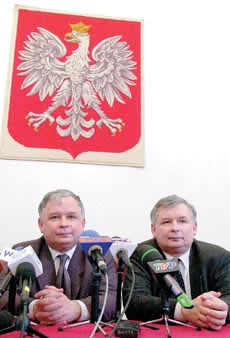Surprise: Kaczynski Again
From the desk of Paul Belien on Mon, 2005-10-24 14:58

Yesterday the Poles elected Lech Kaczynski of Law and Justice (PiS) as their new president, the third to be freely elected since the Poles brought down communism in 1989. Kaczynski, the Mayor of Warsaw, beat Donald Tusk of the Civic Platform (PO) with 53% of the vote against 47% in an election in which slightly more than 50% of Poland’s 30 million eligible voters turned out. Tusk had been a favourite in the polls until late last week. The election result was a surprise and yet a déjà-vu. In last month’s parliamentary elections the same thing happened. Before the parliamentary elections it was generally assumed that PO would become the biggest party, but the elections were won by PiS’s Jaroslaw Kaczynski, Lech’s identical twin brother.
For the first time since becoming a democracy Poland now has a conservative president as well as a conservative government. The latter, a coalition of PiS and PO, is led by Kazimierz Marcinkiewicz, a bland mathematician no-one had ever heard of before. Because Jaroslaw Kaczynski is the leader of the largest party in parliament he should normally have become Prime Minister, the most powerful political position in Poland. As many Poles did not want twins in both top jobs, Jaroslaw, while remaining party leader, decided not to become PM in order not to jeopardise his brother’s chances of being elected president.
PiS and PO are both conservative parties, with Law and Justice (or Kaczynski and Kaczynski) being an equivalent of the German CSU and Civic Platform the equivalent of the German CDU. PO is free-market conservative, while PiS favours state intervention in the economy to provide “social aid” for the underprivileged. PO is a member of the Christian-Democratic EPP (European People’s Party). PiS belongs to the Eurosceptic UEN (Union for a Europe of Nations).
The Kaczynski brothers, who founded their party in 2001, want to end Poland’s current Third Republic by introducing a new constitution which will give more executive powers to the president. They claim that since the fall of communism Poland has been governed by former communists and agents of the former communist secret service, who turned into capitalist mafia gangs, amassing great fortunes. They demand that the former communists and corrupt mafia leaders be brought to court – hence their party’s name. But most of all, said Lech Kaczynski during his campaign, “Poland needs to live in the truth.”
Poland elects a new government every four years and a president (who can serve a maximum of two terms) every five years. This year the general elections and the presidential elections coincided, which meant that quite a few Poles were getting fed up with politics. The Western media have consistently described the election campaign as very negative, which is something the media probably expects when two conservative parties compete. The more conservative of the two, Kaczynski’s party, was also depicted in the Western press as the nastier one. According to Peter Gentle, a British journalist and blogger living in Warsaw, the campaign was “pretty mild stuff, though, compared to what frequently goes on in the West.”
The Western media stress Kaczynski’s traditional Catholicism and Polish nationalism, and wonder (as on Belgian state radio today) “how it is possible for someone who is a conservative to be concerned about social inequities.” There is also criticism of his “virulent anti-gay stance” which as Mayor of Warsaw he is said to have displayed by twice banning a Gay Pride march from the city.
Poland will play an increasingly prominent role in the European Union, where it is the most populous country after Germany, the United Kingdom, France, Italy and Spain (with which it is virtually on a par). The Poles regard themselves as the liberators of Central and Eastern Europe and want to help counterbalance a Franco-German-Russian continental axis, which makes them a natural ally of Britain, despite their not very liberal economic policies.
PiS has a few free-marketeers in its ranks, however, One of them is the newly elected Senator Radek Sikorski, formerly of the American Enterprise Institute in Washington DC. Prime Minister Marcinkiewicz is also said to be a free-marketeer of sorts, though Peter Gentle is not impressed: “He’s considered to be the author of his party’s economic agenda – which is no great compliment as many have noticed that PiS don’t actually appear to have a clear economic policy.” But isn’t that the case with most of Western Europe’s so-called “conservative” parties too?

Kaczynski, the new
Submitted by Dries (not verified) on Fri, 2005-10-28 23:16.
Kaczynski, the new unabomber? :D